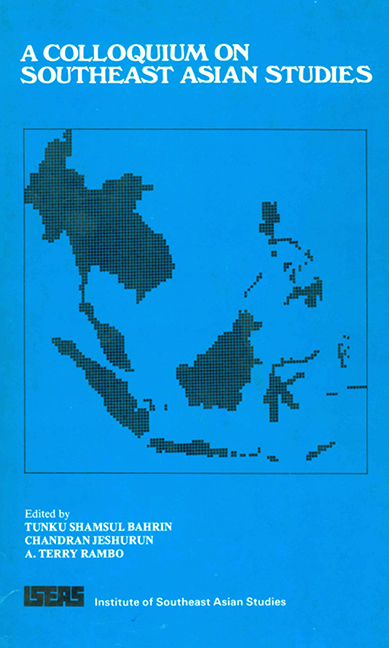Book contents
- Frontmatter
- Contents
- Foreword
- Preface
- Acknowledgements
- Introduction
- Contributors
- PART I TEACHING AND RESEARCH
- PART II ENVIRONMENT AND DEVELOPMENT
- 15 Environment and Development: The Place of Human Ecology in Southeast Asian Studies Programmes
- 16 Environment and Development in Southeast Asia: Trends, Themes and Issues
- 17 Development, Environmental Quality and the Quality of Life in Peninsular Malaysia
- 18 Environment Implications of the Mekong Development Programme
- 19 Development and Environment in Thailand
- 20 Review of Environmental Affairs in Indonesia
- 21 Research and Teaching on Human Ecology in Malaysia
- 22 Human Ecology in the Philippines: Developments in Research, Teaching and Applications
- 23 Environment Education Needs within A Southeast Asian Studies Programme
15 - Environment and Development: The Place of Human Ecology in Southeast Asian Studies Programmes
from PART II - ENVIRONMENT AND DEVELOPMENT
Published online by Cambridge University Press: 21 October 2015
- Frontmatter
- Contents
- Foreword
- Preface
- Acknowledgements
- Introduction
- Contributors
- PART I TEACHING AND RESEARCH
- PART II ENVIRONMENT AND DEVELOPMENT
- 15 Environment and Development: The Place of Human Ecology in Southeast Asian Studies Programmes
- 16 Environment and Development in Southeast Asia: Trends, Themes and Issues
- 17 Development, Environmental Quality and the Quality of Life in Peninsular Malaysia
- 18 Environment Implications of the Mekong Development Programme
- 19 Development and Environment in Thailand
- 20 Review of Environmental Affairs in Indonesia
- 21 Research and Teaching on Human Ecology in Malaysia
- 22 Human Ecology in the Philippines: Developments in Research, Teaching and Applications
- 23 Environment Education Needs within A Southeast Asian Studies Programme
Summary
That human ecology should be an integral part of Southeast Asian Studies is clearly demonstrated by the fact that the explosive pace of development in the region since World War II has disrupted both its natural and the social environments, often in ways that threaten the long-term welfare of the human population. Extensive deforestation due to commercial logging, fuel wood gathering, and expansion of agricultural activities has in many areas, especially the uplands, resulted in heavy soil erosion with consequent rapid downstream siltation of dams, irrigation systems, and estuaries. Water pollution resulting from dumping of industrial effluents and oil spills threatens both the health of human water users and the productivity of aquatic ecosystems. Agricultural modernization with its reliance on monoculture based upon a narrow genetic base brings heightened vulnerabilities to insect and disease threats, while the use of chemical pesticides to counter these threats has long-term ecological implications that are only beginning to become evident.
Environmental changes of this sort are of concern to the student of human ecology, not because he is a conservationist who wants to maintain nature in its pristine state, but because his theoretical perspective informs him that changes in the environment inevitably have human consequences. The human ecology that has been advocated by specialists in the field is thus not primarily academic in orientation. Concern is, as it must be given the pressing nature of regional environmental problems, with finding practical solutions to real world problems. The tone, however, is not one of opposition to development; indeed, several scholars argue that acceleration of development efforts offers-the only solution. What is necessary, however, is to find ways to improve human living standards that do not cause irreparable damage to the productive capacity of the ecosystems on which human survival depends in the long term. Misconceived development efforts, although perhaps resulting in short-term gains to some, can only lead to future impoverishment of the many.
- Type
- Chapter
- Information
- A Colloquium on Southeast Asian Studies , pp. 185 - 194Publisher: ISEAS–Yusof Ishak InstitutePrint publication year: 1981

